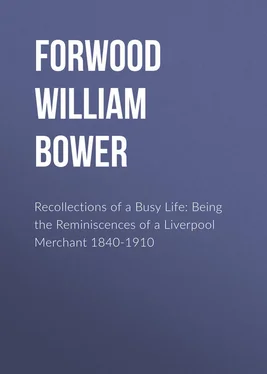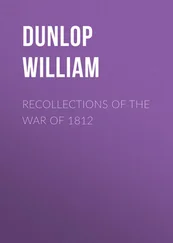William Forwood - Recollections of a Busy Life - Being the Reminiscences of a Liverpool Merchant 1840-1910
Здесь есть возможность читать онлайн «William Forwood - Recollections of a Busy Life - Being the Reminiscences of a Liverpool Merchant 1840-1910» — ознакомительный отрывок электронной книги совершенно бесплатно, а после прочтения отрывка купить полную версию. В некоторых случаях можно слушать аудио, скачать через торрент в формате fb2 и присутствует краткое содержание. Жанр: foreign_antique, foreign_prose, на английском языке. Описание произведения, (предисловие) а так же отзывы посетителей доступны на портале библиотеки ЛибКат.
- Название:Recollections of a Busy Life: Being the Reminiscences of a Liverpool Merchant 1840-1910
- Автор:
- Жанр:
- Год:неизвестен
- ISBN:нет данных
- Рейтинг книги:4 / 5. Голосов: 1
-
Избранное:Добавить в избранное
- Отзывы:
-
Ваша оценка:
- 80
- 1
- 2
- 3
- 4
- 5
Recollections of a Busy Life: Being the Reminiscences of a Liverpool Merchant 1840-1910: краткое содержание, описание и аннотация
Предлагаем к чтению аннотацию, описание, краткое содержание или предисловие (зависит от того, что написал сам автор книги «Recollections of a Busy Life: Being the Reminiscences of a Liverpool Merchant 1840-1910»). Если вы не нашли необходимую информацию о книге — напишите в комментариях, мы постараемся отыскать её.
Recollections of a Busy Life: Being the Reminiscences of a Liverpool Merchant 1840-1910 — читать онлайн ознакомительный отрывок
Ниже представлен текст книги, разбитый по страницам. Система сохранения места последней прочитанной страницы, позволяет с удобством читать онлайн бесплатно книгу «Recollections of a Busy Life: Being the Reminiscences of a Liverpool Merchant 1840-1910», без необходимости каждый раз заново искать на чём Вы остановились. Поставьте закладку, и сможете в любой момент перейти на страницу, на которой закончили чтение.
Интервал:
Закладка:
The Southern Bazaar
Near the close of the war a huge bazaar was held in St. George's Hall, in aid of the southern prisoners of war. It was designated the Southern Bazaar, and the stalls were called after the various states, and were presided over by the leading ladies of the town, assisted by many of the nobility and society people. It was a brilliant success, money was plentiful, and men and women vied with each other in scattering it about. Upwards of £30,000 was realised in the three days.
The Volunteer Movement
No account of the doings in Liverpool in the 'sixties would be complete that did not describe the beginnings of the great volunteer movement, which was destined to occupy so much public attention, and to form such an important portion of our national defence. Liverpool can certainly claim to have initiated the movement. Mr. Bousfield endeavoured to revive this branch of the service in 1853. A few years later he formed a drill club, a very modest beginning, consisting of only 100 men, wearing as their uniform a cap and shell jacket. Captain Bousfield endeavoured several times to obtain recognition by the Government, but failed; and he had to encounter a considerable amount of chaff and ridicule. The public had but little sympathy with the young men who "played at being soldiers." Captain Bousfield was not discouraged, he loved soldiering and was an enthusiast, and his opportunity was soon to arrive. In 1859 the Emperor Napoleon III. became very threatening in his words and ways, and it was apprehended that he might attempt to invade our shores. Captain Bousfield quickly obtained the support of the Government for his volunteers, and the 1st Lancashire Volunteer Regiment was formed. The movement made rapid headway, until we had enrolled in the country upwards of 300,000 men. Colonel Bousfield soon obtained the command of a battalion, and in 1860 was presented with a sword of honour and a purse of £1,800. Liverpool furnished her full quota of volunteers. Colonel Brown commanded a regiment of artillery: Colonel Tilney the 5th Lancashire, a crack regiment; Colonel MacCorquodale the Press Guards; Colonel Bourne, with Major Melly and Captain Hornby (afterwards Colonel H. H. Hornby), the 1st Lancashire Artillery; Colonel MacIver commanded 1,000 of his own men; and among other active volunteers at this time we remember Colonel Steble, Colonel Macfie, Colonel Morrison, Colonel Clay, and many others.
We had also a squadron of cavalry, called the Liverpool Light Horse, Captain Stone in command. I joined the squadron in 1859, and greatly fancied myself mounted on one of my father's carriage horses. We exercised in some fields behind Prospect Vale, Fairfield.
I remember the 1st Lancashire being encamped on the sandhills between Waterloo and Blundellsands. It was the first time any volunteers had been under canvas, and the camp was visited by crowds of people.
Intellectual Life
Liverpool has been always too much absorbed in her commerce to take any prominent position in the world of literature and education, until recent years, when we have atoned in some degree for our remissness in the past, by the founding of our University. Professor Ramsay Muir, in a recent speech, however, claims that we had a Renaissance in Liverpool in the early years of the 19th century, when a group of thinkers, scholars, and writers, finding its centre in William Roscoe, gave to Liverpool a position and a name in the literary world, and she became a real seat of literary activity. To that remarkable man, William Roscoe, we owe the Athenæum, the Literary and Philosophical Society, and the Roscoe collection of pictures now in the Walker Art Gallery. This intellectual effort quickly lost its vitality, and for long years the Literary and Philosophical Society, and the Philomathic Society, struggled alone to keep burning the light of higher culture and literary activity.
Elementary education was almost entirely in the hands of the Church; middle class education depended upon the Liverpool Collegiate, the Mechanic's Institute, afterwards the Liverpool Institute, and the Royal Institution.
The fashion of sending boys to our great public schools did not set in until the 'seventies.
Such was the condition of intellectual life when, in 1880, the Liverpool University College was established, mainly through the efforts of the late Earl of Derby, William Rathbone, Christopher Bushell, E. K. Muspratt, David Jardine, Sir Edward Lawrence, Robert Gladstone, Mr. Muspratt, Sir John Brunner, John Rankin, and William Johnston. The first Principal, Dr. Rendall, rendered excellent service in these early struggling years, which were happily followed by still greater and even more successful efforts under Vice-Chancellor Dale, resulting in the granting of a Royal Charter in 1903, and the founding of a University. The Earl of Derby became Chancellor, and Dr. Dale Vice-Chancellor. The University has been nobly and generously supported by Liverpool men; indeed a reference to the calendar fills me with surprise that so much could have been accomplished within such a brief period. Its work is making itself felt in the general uplifting of the level of education, while the presence in Liverpool of such a distinguished body of professors has had considerable influence in giving a higher and more intellectual tone to society, and in opening up new avenues for thought and activity.
We must not omit to record the excellent work done by the School Board. When first established in 1873, the election of members provoked much sectarian animosity, but in the course of time, through the exertions of Mr. Christopher Bushell and Mr. Sam Rathbone, this hindrance to its success was overcome, and the excellence of its organisation was generally recognised. Its functions have, during the past few years, been transferred to the City Council.
One of the results of the School Board was the founding of the Council of Education, which provided, in the shape of scholarships, the means by which boys could advance from the elementary school to the higher grade schools and the universities. Mr. Sam Rathbone, Mr. Gilmour, and Mr. Bushell were very active in promoting this association.
Society in Liverpool
Society was much more exclusive forty or fifty years ago than it is to-day. The old Liverpool families were looked up to with much respect.
The American war considerably disturbed Liverpool society, and brought to the front many new people. Liverpool became more cosmopolitan and democratic, but there was no serious departure from the old-world courtesy of manner and decorum in dress until the 'eighties, when it gradually became fashionable to be less exacting in dress, and the customs of society grew less conventional.
In the 'sixties people of wealth and position surrounded themselves with certain attributes of power and wealth, which gave to the populace some indication of their rank and their social status, and in manners they were reserved and dignified.
Their homes were in the country or in the fashionable suburbs of the city, and their importance was measured by the extent of their broad acres. A house in London, in which they dwelt for three or four months of the year, was the luxury only of the older families, or of those of great wealth; the fashion of having a flat in London, with a week-end cottage in the country, was not known – this has followed the more democratic tendencies of our times. The bringing of people together in our railway trains, in steamers, in hotel lounges, and foreign travel, have had a distinctly levelling influence. In the 'sixties some old county families still made their annual pilgrimage to visit their friends in the family coach, and the circle of their acquaintances was limited and exclusive. The family carriage with the rumble at the back was a dignified and well-turned-out equipage. The dress carriage, with powdered footmen, was commonly seen in Hyde Park, and was de rigeur at Court drawing rooms, then held in the afternoon; the array of carriages at these functions made a splendid show.
Читать дальшеИнтервал:
Закладка:
Похожие книги на «Recollections of a Busy Life: Being the Reminiscences of a Liverpool Merchant 1840-1910»
Представляем Вашему вниманию похожие книги на «Recollections of a Busy Life: Being the Reminiscences of a Liverpool Merchant 1840-1910» списком для выбора. Мы отобрали схожую по названию и смыслу литературу в надежде предоставить читателям больше вариантов отыскать новые, интересные, ещё непрочитанные произведения.
Обсуждение, отзывы о книге «Recollections of a Busy Life: Being the Reminiscences of a Liverpool Merchant 1840-1910» и просто собственные мнения читателей. Оставьте ваши комментарии, напишите, что Вы думаете о произведении, его смысле или главных героях. Укажите что конкретно понравилось, а что нет, и почему Вы так считаете.








![William Frith - John Leech, His Life and Work. Vol. 1 [of 2]](/books/747171/william-frith-john-leech-his-life-and-work-vol-thumb.webp)

![William Frith - John Leech, His Life and Work, Vol. 2 [of 2]](/books/748201/william-frith-john-leech-his-life-and-work-vol-thumb.webp)

